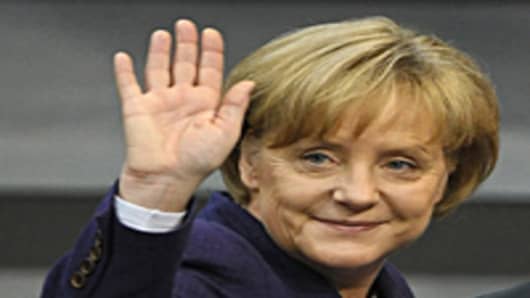Forbes Magazine might have just put German Chancellor Angela Merkel on the throne for the "Most Powerful Woman" in the world, but at home her less exulted throne of government is shaky.
Just back from vacation, "Angie" certainly had a tough week. There is little hope of it getting any easier in the weeks to come. The euro and her handling of the debt crisis is giving her more and more headaches.
It's not enough that she is constantly receiving flack from the opposition and from the markets, she is losing more and more support from within her own coalition camp, and, most disconcertingly, from within her own party.
This erosion of support from her fellow Christian Democrats has been creeping up on her for some time.
Merkel, a great political survivor, has managed to carefully remove all potential contenders for her throne from influential office over the past years, either directly or by pushing them into retreat.
Friedrich Merz, once financial policy spokesman and one of the "upcoming" men of the CDU, was one of them. After constant collisions with Merkel over the course of economic and financial policy, Merz withdrew from the field in Berlin a couple of years ago. Since then, he has had nothing but scathing criticism for the Chancellor's management and direction.
And then there was the former Chief Minister of the state of Hesse, Roland Koch. One of the most powerful men in the CDU for years, he was long touted as the the heir apparent for the leadership of the party and the country. Heading the state that is the home of ECB, Bundesbank, Deutsche Börse and many of the big banks, Koch seemed to understand how markets worked and had a keen vision for Europe and the euro.
Koch, too, resigned and moved over to head construction firm Bilfinger+Berger ostensibly to "meet new and different challenges". But it is an open secret that Koch simply gave up, because he could no longer see himself working with Merkel and had the sinking feeling that she wouldn't give up her post any time soon.
Chickens Coming Home to Roost
Merkel might have secured her "throne" in the short run; but now her autocratic management style might turn out to be a big, fat chicken coming home to roost. She has more and more surrounded herself with people who either haven't got the same competence, who lack a longer-term vision for Germany and for Europe, or who are simply interested in their own political survival within her government.
Another bitter truth for Merkel is that the once proclaimed "dream partner" for a coalition, the Liberals or FDP, has, in real life, turned into her worst nightmare. At virtually every corner, FDP members bridle against her political plans or decisions. The FDP does not want to use extra tax euros just to service the debt; the FDP does not want to sign up on bailout packages and the FDP opposes more funds for the EFSF. And now the FDP even threatens to break up the coalition, if Merkel ever signs up on Eurobonds. Managing the crisis, or so it seems, was a lot easier with the apparently less desirable coalition partner SPD.
Her travails with the Liberals are only part of Angie's present problems. The real opposition that is now forming a front against her comes from within her own party. Wolfgang Bosbach, head of the interior policy committee in the German parliament, has already threatened a "No" to the new ESFS competences and the Greek bailout package. Other leading members of the party are demanding parliamentary approval for every "sizable capital action" of the ESFS or EMS - exactly what the last EU Summit wanted to rule out.
But the arrow which smarted most must have been the one fired by former Chancellor Helmut Kohl, the man that brought Germany unification and the euro, who certainly had and has a vision for Europe. "I am afraid Frau Merkel lost her compass for Germany's Euro policy," Kohl, who was Merkel's mentor in her early political career, told German daily Süddeutsche Zeitung in one of his rare interviews.
He continued: "For the past years, Germany has ceased to be a calculable partner in Europe and on the world stage. If that does not change, it will be not short of a disaster, for the country and for Europe as a whole." Ouch!
There is not denying that the political winds in Berlin are changing. Curiously enough, Merkel does not really have to worry about pushing her EFSF and Greek bailout package through parliament. Thanks to the vast approval from the opposition, it's likely to sail through smoothly enough. If the number of dissenters from within her own coalition reaches a critical level, her own political survival becomes less and less certain; and the vote for Europe could very quickly turn into a vote of confidence for the Chancellor herself.
Whoever said German politics were boring?


